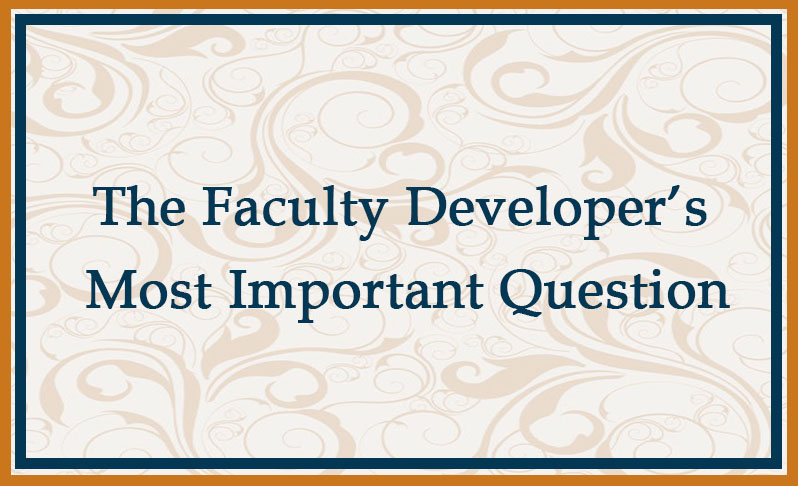To write Creating the Future of Faculty Development (2006), Sorcinelli et al sent out an 18-question survey to a host of faculty developers—e.g., what kind of institution is yours, what are your program goals and purposes, and what services do you currently offer? To our way of thinking, the surveyors omitted the key question.
If you are a director of a center for teaching and learning (CTL) at your institution, what would you consider the single most important question to ask in your position? And for bonus points, to whom would you address this question? Actually, knowing the answer to the latter question should help you tackle the former.
Principle of Audience
While you’re thinking, I’d like to tell you an anecdote. At the beginning of the summer Charlie, Hal, and I wanted to do some research on CTLs in states contiguous to Kentucky, so we wrote some friends who serve as CTL directors for help. One very old friend wrote back, regretting she could not help because she had been removed as center director. Her plight is one of the reasons we decided to write on this topic.
In truth, this key question was suggested to us by our original discipline. All three of us started our careers as instructors in English, and one of the basic rhetorical principles instilled in us in graduate school was the principle of audience. Every time you write, you don’t just write per se, you address a particular audience; and that singular or plural entity determines everything from your style to your word choice, from your degree of formality or informality to the type and amount of evidence you employ. Emailing an old friend, for instance, places different demands on you than writing a piece of educational research or a spec script for The Walking Dead.
Now, our answer.
The most important question for us as faculty developers is: to whom do you report? Why? Because none of the other questions or answers about what you think may matter at all. What matters most is what matters most to your boss.
Provide Based On The Request
A case in point comes from an old friend, Dee Fink, who has written an essay “Innovative Ways of Assessing Faculty Development” (2013). In the article Dee discusses various ways to assess faculty development that take the assessor beyond attendance and satisfaction. While Dee really does offer some innovative assessments, he doesn’t confront what for us is the key reason for the assessments.
What does your boss want from you? If your boss is a basic bean-counter who thrives on reports that offer the number of faculty participants, it doesn’t make sense to provide satisfaction surveys using the psychometric Likert scale, faculty testimonials to what was learned during CTL sessions, or even how individual faculty implemented what they learned.
We once had the owner of the local McDonald’s tell us that customers come in looking for hamburger, so he doesn’t feed them steak. Actually, that was then, and McSteak and McLobster can now be found seasonally at regional McDonald’s.
Which brings up another important guideline. While you give your boss what s/he wants, nothing is wrong with supplying a little additional information (like student reflections on techniques Professor X learned in your flipping the classroom workshop) just as long as you also provide the hamburger.
Create Consistent Communication
In previous posts we (Hal, Charlie, and I) have described how we have a weekly Tuesday morning meeting. What we haven’t mentioned is that we also have monthly meetings with our boss, the dean of University Programs. Our Tuesday morning agendas usually contain some information about a meeting or other communication with her that we need to work on. For instance, as the University just came out with a new five-year strategic plan, we were told to rewrite our unit’s last plan so as to align with that of the University.
Simultaneously, we have been busy gently nudging our dean to urge her boss to move toward a required professional development plan for each faculty member. Nudging is good, but unless you provide the basic hamburger, you might not be around to serve much longer.
Author
 Dr. Russell Carpenter is director of the Noel Studio for Academic Creativity and Program Director of the Minor in Applied Creative Thinking at Eastern Kentucky University. He is also Assistant Professor of English. Dr. Carpenter has published on the topic of creative thinking, among other areas, including two texts by New Forums Press. In addition, he has taught courses in creative thinking in EKU’s Minor in Applied Creative Thinking, which was featured in the New York Times in February 2014. Meet Russell.
Dr. Russell Carpenter is director of the Noel Studio for Academic Creativity and Program Director of the Minor in Applied Creative Thinking at Eastern Kentucky University. He is also Assistant Professor of English. Dr. Carpenter has published on the topic of creative thinking, among other areas, including two texts by New Forums Press. In addition, he has taught courses in creative thinking in EKU’s Minor in Applied Creative Thinking, which was featured in the New York Times in February 2014. Meet Russell.



